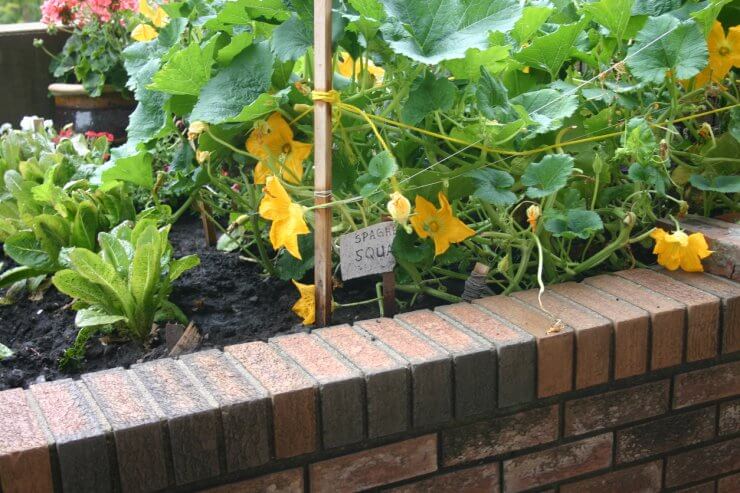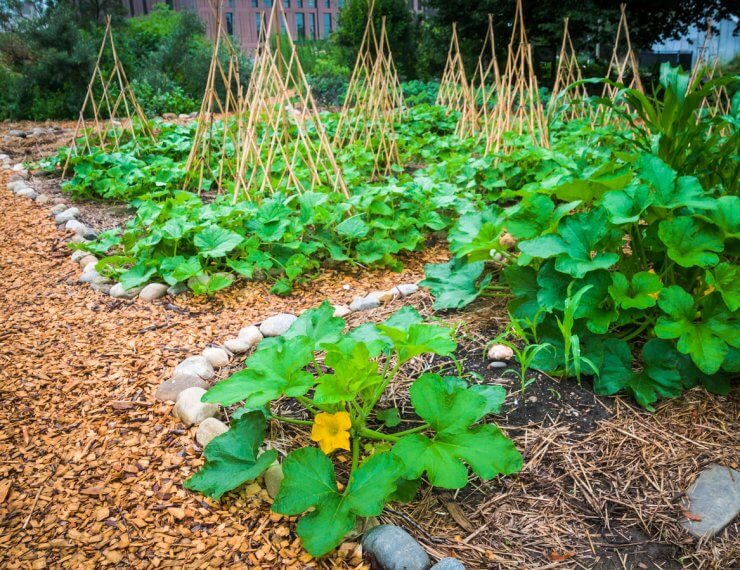
Buttercup squash growing in the ground
Winter squash need lots of sunshine in order to thrive—at least six hours of sunshine a day. They’ll tolerate partial shade, but that could reduce the size of the roots. They also need well-drained soil with a pH of 6.0 to 6.8. They don’t need a lot of fertilizer to get going, but you can mix in a little 10-10-10 fertilizer. If you’re just growing a few plants, work 2 to 3 tablespoons of fertilizer into the top 4 inches of the soil.
Planting in the Ground
The easiest way to plant winter squash is to plant seeds directly in the ground. For spring plantings in temperate zones, plant your seeds once the soil temperature has reached at least 70 degrees F. Winter squash do not like the cold, and a frost can severely damage seedlings.
Seeds should be planted an inch down, narrow edge up, in mounds or hills. Plant six seeds per mound, in a circle. Seeds will take a week or two to germinate. If you want to help the process along, you can soak your seeds in water overnight before you plant them,
Keep the soil evenly moist during the germination period and throughout the growing season. But don’t overdo it on the watering—about an inch of water a week is usually enough.
Planting in Raised Beds

Spaghetti squash growing in raised bed on terrace
A raised garden bed or planter is an excellent option for growing winter squash if you don’t have soil that’s ideal for winter squash (heavy clay soil, for example). Raised beds also help with drainage, which is essential for healthy squash plants. You can buy raised beds or build one yourself to fit your space.
Watering and weeding will be easier if you have your winter squash in a raised bed or planter. It’s a good alternative to growing in open land—just make sure you plant a variety that will fit in the growing space you are providing. If you fill a raised bed with packaged garden soil, you know you’re providing a cleaner and healthier environment for your plants from the outset.
Packaged garden soil means less weeding than you’d have from digging a hole in the ground; and with a raised bed or container, there’s less bending down to do your weeding!
Plant Spacing
When your seedlings get to be 2 to 3 inches tall, thin them to 3 feet apart. If you’ve planted in hills, thin the ranks down to just three seedlings per hill. Snip out the seedlings that don’t make the cut. This is better than pulling them out of the ground, where you could damage the root systems of the remaining seedlings. Depending on the type of squash you’re growing, your rows should be 3 to 8 feet apart.
Companion Planting

Winter squash growing alongside cucumber vines in the garden
The Indigenous peoples of North America originated the first companion plantings with winter squash. They planted a Three Sisters garden—squash, corn, and beans. The corn supported the beans; the beans reinforced the corn and fixed nitrogen in the soil; and the squash shaded out weeds and helped retain soil moisture.
You can try a Three Sisters garden planting; just check the planting dates for each crop in our corn and green beans collections.
Of course, the most basic companion planting can help attract beneficial insects and deter pests, from small insects to hungry herbivorous mammals like rabbits and deer. Companion planting also helps add nutrients to the soil, reduce soil erosion, and shelter your winter squash from harsh weather and hot sun. It also matches plants with soil and nutrient needs different enough that they help, rather than hinder, the growth of both plants.
Good companion plants for winter squash include radishes. Plant a fence of radishes around your squash to deter pests like squash bugs. Don’t use these radishes as a crop; instead, let them grow tall to do their deterrent work. You can harvest their seed pods after they flower and use them in salads.
Other good companion plants include borage, which attracts bees and wasps and can help keep the pest population down. Cucumbers, onions, garlic, and cabbage are other good companion plants.
Mint does a great job of deterring bad insects and attracting good ones; the only problem is that mint is massively prolific and will take over any open space in which it’s planted. So, if you have a mint patch elsewhere, you can chop up mint leaves and scatter them among your squash plants. Or put containers of mint out with your squash—just be sure to bring those containers in from the garden before your mint flowers, or you’ll have mint everywhere.
Plants that do not grow nicely with winter squash include potatoes and tomatoes.
How do you plant your winter squash? What criteria for site selection has worked for you? Do you use your winter squash as companion plants? Please share your ideas with us.


 Previous
Previous

